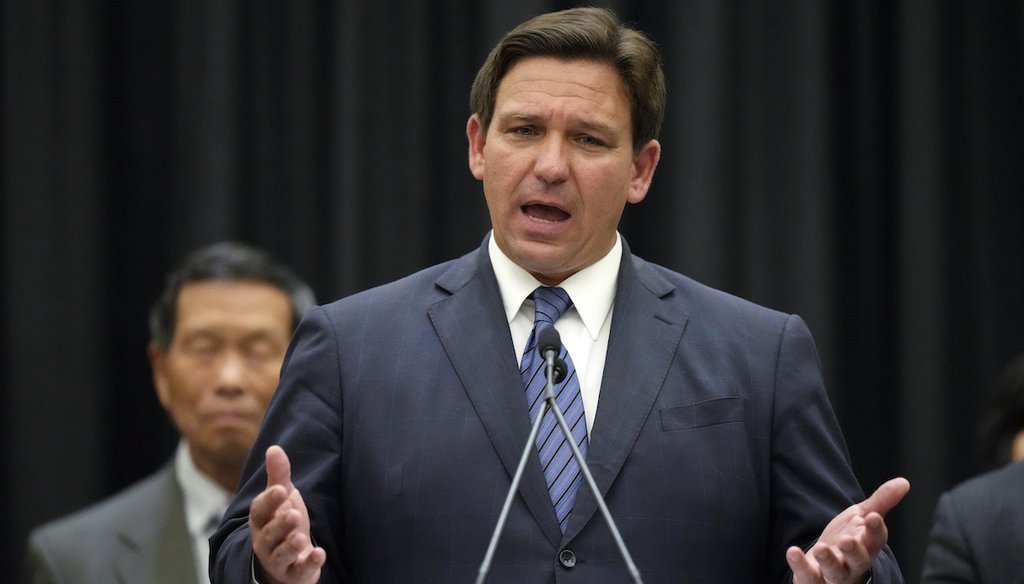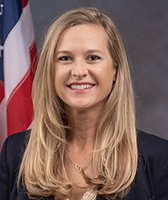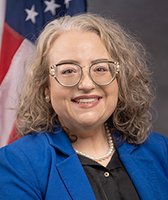Stand up for the facts!
Our only agenda is to publish the truth so you can be an informed participant in democracy.
We need your help.
I would like to contribute

Florida Gov. Ron DeSantis speaks during a press conference on Sept. 22, 2022, in Miami. (AP)
If Your Time is short
-
Most of the migrants received humanitarian parole after entering the U.S. and plan to apply for asylum. Humanitarian parole allows people to remain in the U.S. temporarily for a compelling emergency.
-
People can apply for asylum within one year of their arrival, regardless of how they entered the U.S.
-
There is debate over whether people who cross the border to apply for asylum are entering the country illegally. However, once a person has an asylum application in process, they are allowed to remain in the U.S. as they await a decision.
Florida's Republican Gov. Ron DeSantis used state taxpayers' money to relocate about 50 migrants from Texas to Martha's Vineyard, Massachusetts.
DeSantis accuses President Joe Biden of not doing enough to secure the southern border. He said that many of the people who arrive there intend to go to Florida — and aren't welcome.
"Our message to them is we are not a sanctuary state, and it's better to be able to go to a sanctuary jurisdiction," DeSantis said Sept. 15, a day after two planes took Venezuelans to Martha's Vineyard. "And yes, we will help facilitate that transport for you to be able to go to greener pastures."
The migrants were in San Antonio before being flown to Florida and then to Martha's Vineyard.
DeSantis' move — similar to what other Republican governors have done — has drawn a lot of national attention, misinformation and confusion. Here, we'll sort out what we know about the immigrants at the center of this story and the related laws and policies.
Most of the migrants received humanitarian parole after entering the U.S. and plan to apply for asylum, lawyers representing the migrants told PolitiFact. Humanitarian parole allows people to remain in the U.S. temporarily for a compelling emergency.
In general, the parole can be granted for any "urgent humanitarian reasons," including protection from targeted or individualized harm. The lawsuit said some of the migrants fled to the U.S. to protect themselves and their families from "state-sponsored violence."
"We are still ascertaining the circumstances surrounding parole," said Iván Espinoza-Madrigal, executive director of Lawyers for Civil Rights, which represents 30 of the migrants. "I suspect the designation was made based on their hardship coupled with their nationality: the crisis in Venezuela is well-known and documented."
Venezuela's authoritarian leader, Nicolás Maduro, assumed office in 2013. The country has experienced rampant inflation, human rights abuses and dwindling food and supplies.
Lawyers representing the migrants shared a brochure that they say Florida officials gave the migrants before they left Texas. The leaflet mentioned housing assistance, cash assistance, and other support.
DeSantis' office confirmed the brochure's authenticity, which is about benefits available to refugees. (The Venezuelan migrants are not refugees under immigration law.)
On Sept. 20, three of the migrants sued DeSantis, alleging that they were misled about the resources they'd be eligible for in Martha's Vineyard.
People granted humanitarian parole are generally ineligible for public benefits.
The Office of Refugee Resettlement in the U.S. Department of Health and Human Services provides several federally funded benefits to refugees and people granted asylum, including cash assistance and short term medical coverage.
Refugees are eligible for those benefits upon their arrival, but asylum seekers are not eligible until their application is approved, said Kathleen Bush-Joseph, associate policy analyst for the nonpartisan Migration Policy Institute.
People granted asylum and refugees are legally allowed to work in the United States.
Refugees, as defined by U.S. law, are people outside of the U.S. who fled their home countries because of persecution related to race, religion, nationality, political opinion or membership in a particular social group.
The United Nations High Commissioner for Refugees, a U.S. embassy or a designated nongovernmental organization can refer a person to the U.S. refugee program.
Prospective refugees must pass biometric and biographical background checks and be interviewed by U.S. Citizenship and Immigration Services officers overseas.
"Asylum seekers similarly have to meet the legal definition of 'refugee,' but to be eligible for asylum one must already have made it to the United States," said Washington University law professor emeritus Stephen Legomsky, former U.S. Citizenship and Immigration Services chief counsel.
People can apply for asylum within one year of their arrival, whether they entered the country legally or illegally.
Migrants who are apprehended or turn themselves into immigration officials are generally placed in removal proceedings. They can apply for asylum as a defense against that removal.
There is a political debate over whether people who cross the border to apply for asylum are entering the country illegally. DeSantis and others say that people who come in without any prior authorization are doing so illegally, even if they ultimately apply for asylum.
"America is apparently the only nation on earth where you can enter by violating our laws and then a week later sue the government whose laws you violated," U.S. Sen. Marco Rubio said in a Sept. 21 Instagram post.
Immigrant rights advocates argue that because physical presence in the U.S. is a requirement to apply for asylum, their entry should not be considered illegal, even if they were apprehended by or turned themselves into Border Patrol agents.
Debate aside, immigration experts told PolitiFact that people have the legal right to seek asylum in the United States.
"While people who present themselves at the border to claim asylum may not have status at the time of their arrival at the border, they are exercising their right to request asylum," said Bush-Joseph, from the Migration Policy Institute.
One thing is clear: Once people have asylum applications in process, they are allowed to remain in the country as they await a resolution of their immigration case.
The same law that provides for the removal of people who are found to be inadmissible carves out an explicit exception for asylum seekers, Legomsky said. That law requires immigration officers to refer applicants for asylum interviews, not remove them.
Asylum seekers, he said, "have the unqualified right to remain in the United States unless and until their applications are denied."
Staff writer Maria Ramirez Uribe contributed to this report.
Our Sources
Email interview with Stephen Legomsky, professor emeritus at Washington University School of Law in St. Louis, Sept. 20, 2022
Email interview with Iván Espinoza-Madrigal, executive director for Lawyers for Civil Rights, Sept. 21, 2022
Email interview with Kathleen Bush-Joseph, associate policy analyst for the nonpartisan Migration Policy Institute, Sept. 21, 2022
Lawyers for Civil Rights, Legal First Responders for Migrants in Martha's Vineyard, assessed Sept. 21, 2022
TRACImmigration, Asylum Decisions, assessed Sept. 20, 2022
PolitiFact, The Republican proposal to change the U.S. asylum system, explained, Jan. 23, 2019
PolitiFact, No, immigrants cannot apply for asylum at U.S. embassies or consulates abroad, July 10, 2018
PolitiFact, What is the Biden administration saying about the refugee admissions cap for 2021, April 20, 2021
U.S. Citizenship and Immigration Services, Refugees, assessed Sept. 20, 2022
U.S. Citizenship and Immigration Services, Asylum, assessed Sept. 20, 2022
U.S. Citizenship and Immigration Services, Refugees and Asylum, assessed Sept. 20, 2022
U.S. Citizenship and Immigration Services, Refugee Eligibility Determination, assessed Sept. 20, 2022
U.S. Citizenship and Immigration Services, Refugee Processing and Security Screening, assessed Sept. 20, 2022
U.S. Citizenship and Immigration Services, Obtaining Asylum in the United States, assessed Sept. 20,
U.S. Department of Homeland Security, Refugees and Asylees, assessed Sept. 20, 2022
Administration for Children and Families, Asylee Eligibility for Assistance and Services, July 12, 2012
Migration Policy Institute, Refugees and Asylees in the United States, May 13, 2021
Congressional Research Service, Immigration: U.S. Asylum Policy, Feb. 19, 2019
Congressional Research Service, The Law of Asylum Procedure at the Border:
Statutes and Agency Implementation, April 9, 2021
Congressional Research Service, Refugee Admissions and Resettlement Policy, Dec. 18, 2018


















































